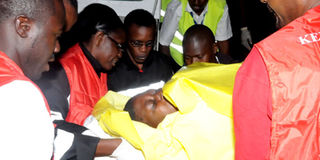Death of Muslim preacher exposes the real face of terror

A victim of the Garissa churches terrorist attack being wheeled into a waiting ambulance at the Wilson Airport on July 1, 2012. Photo/FILE
When terrorists walked up to the Africa Inland Church (AIC) compound in Garissa last Sunday and went on a shooting spree they most probably sought to stoke religious tensions in the multi-religious community.
But they only ended up exposing the indiscriminate face of terror.
They shot dead two police officers on guard before turning to worshippers inside the church.
One of the two officers, Issa Mohamed Aden, was a Muslim preacher belonging to the internationally respected Sunni sect Tabliq Jamaat.
The group urges Muslim faithful to strictly follow the teachings of Prophet Mohamed (pbuh), presents itself as non-political and preaches against violence in principle.
In Sankuri village where his late father Sheikh Mohamed Aden was Imam and Kadhi, the officer stepped into his father’s shoes, running the affairs of the mosque during his off days in the village 25 km from his working station.
His elder brother Abdirahman Mohamed, who is the area chief, said the slain officer promised to donate Sh10,000 to the mosque out his salary just before he met his brutal death. The family fulfilled that promise two days after his death.
His mother Fatuma Maalim Omar says that the killers of her son and 16 Christians should not escape unpunished.
She appeals to anyone with information on the killers to cooperate with the security organ for justice to prevail.
The villagers, who refer to the officer as Sheikh Issa, speak fondly remember his spiritual role in the community.
But the family is disappointed that no one from the police force has paid them a visit since the incident occurred.
The family is not the only one in mourning. Al Shabaab struck Mandera town this week killing a young girl after they missed her father, a police reservist.
Fears that the incident was likely to explode into a religious conflict prompted religious leaders from the Muslim and Christian faiths to ask residents unite against the terror attack.
“Al-Shabaab had one main intention of creating a seed of hate and discord between the Christian and Muslim communities in Kenya and make the most out of the animosity,” said Sheikh Hussein Mahat of the Council of Imams in Garissa.
“They did not suceed with their ill motives since we all stood together during the difficult moment condemning them and we need to stop their next course of action,” said the Sheikh.
He described the killers as weird, noting that they were killing the innocent contrary to teachings of the holy books.
Officials of the Supreme Counci of Kenyan Muslims (Supkem) and the Council of Imams said five religious leaders have been killed by hit men suspected to be from Somali within Garissa town and in the refugee camps.
“We are not taking chances since they may change tactics in their bid to create conflict and that is why metal detectors were used in Jamia mosque during Friday prayers,” said Mr Hassan Mohamed.
Worshippers who survived the AIC church attack said the incident will not stop them attending Sunday service.
Residents who spoke to the Sunday Nation said they were determined to offer prayers to the dead and injured.
Most of the affected are from the neighbouring Kitui County who do construction work and engage in livestock trade.
Others are from Thika and operate retail shops, sell fruits and vegetables or operate transport businesses.
Mr Kaunda Karanja, originally from Thika town, has been a trader in Garissa town for the last 10 years.
He said the attacks caused a big loss to many traders in the horticultural business having occured during the peak season.
He recalls buyers and sellers at the Suk Mukdi market where he operates his business was left as buyers and sellers scampering to safety as soon as the blasts went off and businesses closing in haste.
Mr Erick Gicheru, another business man at the market, says that though Garissa is generally peaceful, the situation can be fickle.
He cites the recent riots that hit the town over the cancellation fo the 2011 KCSE examination results.
Mr Gicheru says it has not been business as usual at Suk Mukdi and Suk Korehe, the main markets in Garissa town, since the attacks. Before the attacks arrival time was 4 a.m. Not any more.




